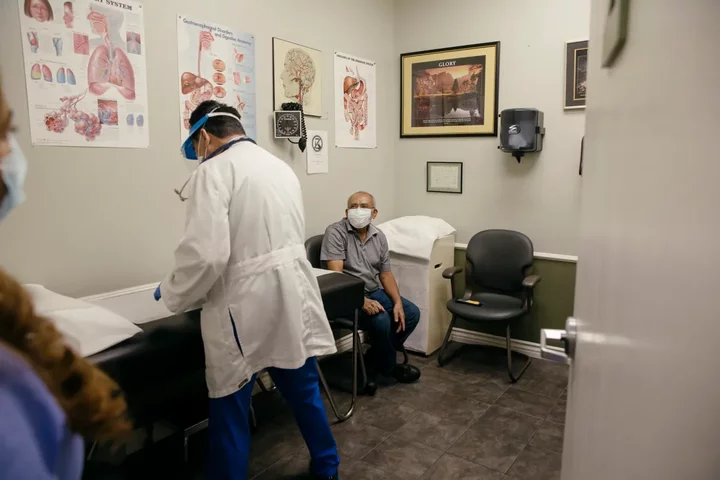The Trump administration is ending billions of dollars in COVID-related grants, and California stands to lose hundreds of millions of dollars. Here, a doctor visits with a patient at the Gabriel Medical Center in East Los Angeles on Sept. 14, 2021. Photo by Jessica Pons for Calmatters.
###
This story was originally published by CalMatters. Sign up for their newsletters.
###
California may lose more than $1 billion in public health and mental health funding as a result of new federal budget cuts that target COVID-19 pandemic response grants, according to the U.S. Department of Government Efficiency website.
The federal Department of Health and Human Services terminated $12 billion intended for infectious disease response, mental health services and other public health issues, according to national reports.
Most of the money came from the Centers for Disease Control and Prevention, while $1 billion was cut from the Substance Abuse and Mental Health Services Administration.
California officials are still tallying up the money because the Trump administration clawed back additional health-related grants that went to counties and the University of California.
Dr. Erica Pan, the state’s top public health officer, confirmed in a statement that the CDC notified California officials that it intends to “immediately end” pandemic-era funding, which was scheduled to last in some cases until 2027.
The money currently supports services such as respiratory virus testing and monitoring and childhood vaccinations. It is also used to improve public health data systems and to address health disparities, Pan said.
In an interview with the news website Fierce Healthcare, the state health department said the public health grant terminations total $709 million. The health department did not immediately confirm that number for CalMatters.
Separately, The California Department of Health Care Services also had five grants terminated this week totalling more than $700 million, according to the U.S. Department of Government Efficiency website. Officials for health care services, which oversees the state’s mental health programs and Medi-Cal insurance program for low-income residents, did not immediately respond to questions about the canceled funding.
COVID grants lasted several years
The federal government awarded billions of dollars in emergency relief to state health departments during the COVID-19 pandemic. After the federal public health emergency ended in 2023, Congress allowed states to use the money for other public health investments.
“All Californians deserve to live in healthy and thriving communities, which is the role of public health,” health officer Pan said. “CDPH remains committed to seeking the resources required to support the critical, lifesaving infrastructure needed to keep people healthy and protect them against infectious disease, vaccine-preventable diseases and health emergencies.”
A representative for the U.S. Department of Health and Human Services defended the cuts.
“The COVID-19 pandemic is over, and HHS will no longer waste billions of taxpayer dollars responding to a non-existent pandemic that Americans moved on from years ago,” HHS Director of Communications Andrew Nixon said in a statement to NBC News, which first reported the cuts.
California is using the money to address a number of persistent public health challenges, including record rates of sexually transmitted infections, the emerging threat of bird flu and a deadly flu season.
Hundreds of dairy herds in the Central Valley have been decimated by bird flu, or H5N1, in the largest outbreak in the country. At least 38 people have also been infected, including a child with no known contact with cattle or other wild animals.
The most recent influenza season was the deadliest in years. More than 1,400 people have died, including 24 children and teens, according to state data.
Michelle Gibbons, executive director for the County Health Executives Association of California, said local health departments’ ability to carry out vital functions will be severely diminished by the funding loss. Many have come to rely on the money for daily operations after decades of underfunding at the state and federal levels.
As a result of the cuts, laboratories will have less testing capacity and investigations into disease outbreaks will slow, Gibbons said. Data systems that were created with federal money to automatically report test results and track vaccine availability will revert back to manually-maintained spreadsheets, and health agencies will likely have to make difficult decisions about laying off personnel, she said.
“Helping people understand the role and the value of public health is challenging, because when public health is working, you don’t actually see it,” Gibbons said. “(But) we’ve already seen what happens when we take funding out of our public health infrastructure.”
DOGE health cuts to UC and California counties
The Department of Government Efficiency website lists another $103 million dolled out directly to California counties that also has been eliminated. The money was intended for Riverside, Los Angeles, Sacramento, San Francisco, San Bernardino, San Diego and Tulare counties, among others.
An additional $169 million in health funding has been terminated from California universities this week, including six University of California campuses, according to the website.
The University of California is part of an ongoing lawsuit aimed at stopping the Trump administration from halting billions of research funding allocated by Congress.
Los Angeles County Department of Public Health officials said in an unsigned statement that a grant related to epidemiology and laboratory capacity has been rescinded by the federal government. The state health department has also given the county informal notice that funding for the county’s vaccine services will likely be terminated as a result of federal action.
In total the department expects to lose “more than $45 million in core LA County Public Health funding.”
“Much of this funding supports disease surveillance, public health lab services, outbreak investigations, infection control activities at healthcare facilities, and data transparency,” officials said in the statement.
###
Supported by the California Health Care Foundation (CHCF), which works to ensure that people have access to the care they need, when they need it, at a price they can afford. Visit www.chcf.org to learn more.

CLICK TO MANAGE